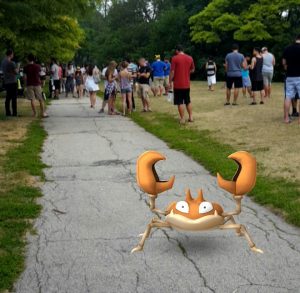 Okay, I admit it. I’m playing Pokémon Go. It’s frustratingly addictive.
Okay, I admit it. I’m playing Pokémon Go. It’s frustratingly addictive.
For those who don’t know, Pokémon Go is an app for smartphones; the app is free, but players can make in-app purchases. The idea is for each player to “catch” creatures known as Pokémon, which the player does by “throwing” what is called a Pokéball at them. Once you catch the creatures, each of which has its own special powers and abilities, you can “evolve” them into stronger, more powerful creatures and you can go to gyms to “battle” other players.
Pokémon Go uses GPS to figure out where a player is located and presents the player with that “map.” Pokéstops (where players can go to get free goodies they need to play the game) and gyms are represented on the map as actual places, usually public places like parks, sculptures, or churches. To get to a Pokéstop or to battle at a gym, a player needs to physically move herself to that location. For example, the Marquette University campus is full of Pokéstops—e.g., a few sculptures on the southeast side of campus, one of the signs for the Alumni Memorial Union. Dedicated players certainly get some exercise.
Pokémon Go is also interesting because of how it mixes your real-life location with the mythical creatures. When a creature appears, you can take its picture, as if the Pokémon is right there in your real world. (See the pictures in this post.)
But Pokémon Go has been at the root of a number of accidents and incidents and it raises a number of interesting legal issues.
Because players need to focus on their smartphones to locate and catch Pokémon, players are not paying attention to the real world and its everyday hazards. We’ve already heard of people playing while driving, which has causes car accidents (e.g., here, here, and here), people who have used the game to rob other players, people playing the game who have discovered dead bodies instead of Pokémon, and even a couple of kids who unwittingly and illegally crossed the border from Alberta, Canada, into Montana in pursuit of Pokémon.
Aside from the accidents and incidents, the game raises a host of interesting legal issues. For instance, what if the Pokéstop or gym ends up being someone’s house and people show up at all hours to “train” at the gym? Or what if the Pokéstop or gym is in a body of water? Is that safe for players? And what about if players need to find water to “catch” the water type Pokémon, quarries or other rocky areas to catch the rock type Pokémon, cemeteries to catch the ghost/fairy type Pokémon, and power plants to catch electric type Pokémon? One can easily imagine issues of personal injury, trespass, or attractive nuisance, among other issues.
As well, players can use what are called “lures” at Pokéstops. A lure is supposed to bring Pokémon out to the Pokéstop so you can catch them, and a Pokéstop with a lure is visible to other players in that area; thus, the lure draws other players to the Pokéstop. Some teens in Missouri used this technique to lure players to a Pokéstop only to rob them, but other legal issues could arise. For example, what if a sex offender shows up at a Pokéstop or gym to play the game and, thus, interacts with children? What if a sex offender uses a lure to draw children to a Pokéstop? Or, considering that a Pokéstop draws children (although, to be sure, not all Pokémon Go players are children), should a registered sex offender be allowed to live near one?
Or what if a lure or the sighting of a rare Pokémon causes hundreds of people to congregate at a Pokéstop or a popular area for Pokémon? Should that be regulated? Can it be?
And what of privacy issues? If a player finds a Pokémon in the locker room at the gym and she takes a picture of it, with other gym patrons in the background, is that okay? What about all the information my playing the game has given Niantic, the game’s developer, about me, where I live, and where I go? What if that information is hacked? And further, what did I agree to, anyway, when I clicked on through in a hurry to get to the game? (Just a few of the posts on possible legal issues: here, here, and here.)
Even if you can catch Pokémon anywhere, should you? Both Arlington National Cemetery and the Holocaust Museum have asked visitors to refrain from playing the game in those places. And while you might find some interesting Pokémon in the courthouse, it’s best—as an officer of the court—to avoid catching them. There aren’t many in Eckstein Hall, but even if they could be found, you can be certain that no professor will appreciate you catching one during class.
But there are still several weeks left before school starts; I’m off to locate that Charmeleon I missed.

Players have been robbed and fell off of cliffs and I have even heard of a wild west style shootout with Pokemon player defending himself against armed robbers. I am pretty sure we will see lawsuits arriving soon.
Torts students pay attention! Prof. Mazzie has provided you with an excellent example of what “issue spotting” means. Looking forward to meeting all of the 1L’s. Welcome to MULS!